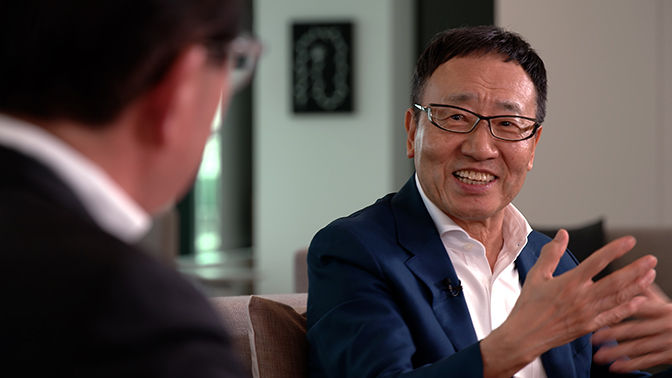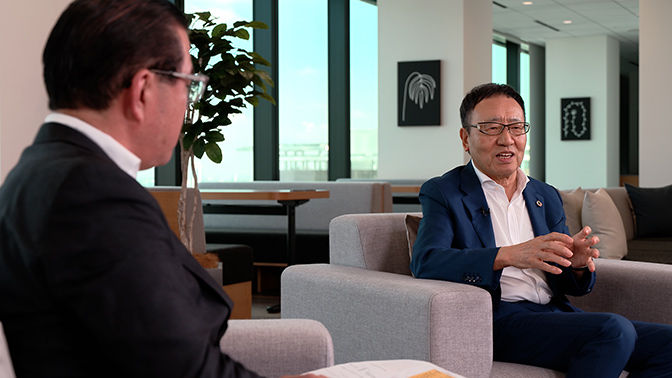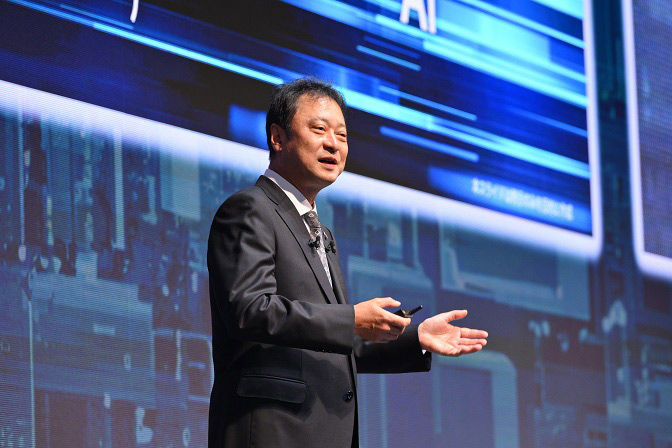
For the first time since 2019, SoftBank World, SoftBank's largest event for enterprise customers, returned as an in-person event in Tokyo in October 2023. In addition to keynotes, panel discussions and exhibits that ran from October 4 to 6, SoftBank World 2023 featured an exclusively online series of sessions on October 3, or Day 0. One highlight of Day 0 was an online interview where Ken Miyauchi, Director & Chairman of SoftBank Corp. (TOKYO: 9343), spoke with Michiaki Tanaka, a Professor at Rikkyo University’s Graduate School of Business Administration, to discuss the implications of generative AI for businesses and the future course of the Information Revolution. Below are some highlights.
Transitioning to a world where generative AI is the norm
Miyauchi pointed out that AI, which was previously a subject of research, has now become an integral part of our lives.
“When we want to know about something, our habit is to do a Google search. Just as the act of searching the web has naturally become a part of our daily lives, I believe generative AI will also weave itself into our routines. And since we carry smartphones in our pockets or handbags, we can now use AI on these devices. The world is transitioning toward AI that's always close at hand, interpreting information for us. To think that we now have tools in our pockets that can aid us like trusted confidants is truly astounding," he said.

Rikkyo University Professor Michiaki Tanaka (left) in conversation with SoftBank Corp. Chairman Miyauchi (right)
Miyauchi noted that the enterprise (B2B) sector is now undergoing a transformation with generative AI, just like the consumer (B2C) realm.
"When I visited Silicon Valley in June this year, NVIDIA's CEO Jensen Huang told me about generative AI’s explosive development. He said industry will see a transformation into AI factories. By 'factory,' he didn't mean manufacturing plants in the traditional sense. He was talking about a future where every industry will filter data through AI and produce outputs accordingly,” he said.
“There are companies creating generative AI on top of a cloud computing foundation. Building generative AI comes with significant costs, which is probably why partnerships like the one between OpenAI and Microsoft are forming. However, what's even more important is the application layer that’s being built on top of generative AI. I was told that there are about 15,000 startups already operating in this application layer."
Services and apps to take center stage
Miyauchi pointed out that companies in Japan, including SoftBank group companies, are already actively using AI.
"At SoftBank we’ve always worked to automate various business tasks, and have already implemented AI at our companies. Using generative AI in the future will not just be about large language models (LLMs) for simple language processing. It’ll also be about multi-modal processing, which means AI can perform computer programming tasks by combining multiple types of data. Furthermore, as AI integrates video and images, completely new and fast-growing markets could emerge. As a digital platformer, SoftBank is keen to explore a business landscape like this.”
Miyauchi suggested that by leveraging AI, services and apps could become even more effective and user-friendly.
Creating and utilizing homegrown data
Tanaka asked Miyauchi where he thinks SoftBank will have an advantage as generative AI amplifies the digital platformer dimension of its business.
“While various industries exist, what’s common to all of them is the importance of data. Generative AI can promptly answer a plethora of questions. But what's truly essential is how we make each industry learn from its own data within this AI framework.”

“Of course, the data that organizations like OpenAI have is vital. Still, what’s equally important is how we develop data specific to industries and individual companies. Training data is known as annotation, and it's crucial we perform this ourselves.
“Depending on the situation, we may either use our own data or connect with entities like Microsoft or OpenAI. I believe it's going to be a combination of both. We have to take the initiative and challenge ourselves. Relying solely on technologies from outside Japan won't suffice," explained Miyauchi.
Evolving and streamlining IT infrastructure
Miyauchi also touched upon how the Information Revolution is continuing to evolve.
"The progress of the Information Revolution follows a curve resembling the y=ax² graph, indicating an intense surge. I believe there's still a lot more to come. Today's smartphones have powers comparable to the supercomputers of the 1980s. We’re seeing a downsizing in storage, where capacity has grown massively, and there's a marked increase in miniaturization and densification. Storage has become more compact and drastically cheaper, and CPUs have evolved. This is especially true of GPUs, which now come with incredible capabilities."

Miyauchi noted that other IT environments have seen considerable shifts.
"The cloud computing environment is now well-established. The world of AI felt distant in the past because the IT infrastructure wasn't in place. But now, everything is cheaper, miniaturized, and organized. Smartphones in our pockets are connected to the cloud. With this infrastructure in place, we might be enabled to accomplish unprecedented feats.
“There's a lively debate now taking place about whether AI resembling humans is good or bad. What’s more important, however, is how we implement AI into industry or the consumer space. Depending on how we create business models, we may see some very intriguing developments surface," Miyauchi said.
Breaking free from conventional thinking
Amid the relentless speed of AI’s advancement, Miyauchi suggested that while major IT companies in the US will continue to get stronger, venture companies in Silicon Valley should also be benchmarked.
"The main difference between American companies and Japanese companies is that American companies are free of restrictive thinking. When a new use case emerges, existing perspectives can be quickly overturned or disrupted. In such a landscape, it's essential to observe what cutting-edge tech enthusiasts and new ventures companies around the world are doing. After all, we can easily access this information through the Internet.
“This isn’t my own subjective opinion – it’s about observing how people are overturning the status quo. This, I believe, is what differentiates Japanese venture companies from those based in Silicon Valley."

"Silicon Valley companies take bold steps and don't always succeed. But the cycle doesn’t stop at failure. The current smartphone paradigm might see a complete overhaul, and someone will likely conceive of that transformation. Ideas shouldn't only evolve in a linear fashion; they could be based on concepts emerging from entirely different backgrounds. Combining new ideas like these with advanced technology and infrastructure can lead to exciting new possibilities," he said.
Miyauchi pointed out that while the world has always faced various challenges, thoroughly considering how to solve these issues can potentially pave the way for new business opportunities.
Related news
(Posted on October 31, 2023)
by SoftBank News Editors




